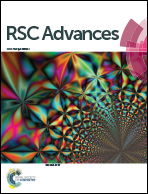Reduction free room temperature synthesis of a durable and efficient Pd/ordered mesoporous carbon composite electrocatalyst for alkaline direct alcohols fuel cell†
Abstract
The development of easy and environmentally benign synthesis methods of efficient electrocatalysts for use in energy conversion applications motivates researchers all over the world. Here we report a novel and versatile method to synthesize well-dispersed palladium-functionalized ordered mesoporous carbons (Pd–OMCs) at room temperature without any reducing agent by one-pot mixing of tri(dibenzylideneacetone)palladium(0) (Pd2DBA3) and OMCs together in a common N,N-dimethylformamide (DMF) solution. The formation of Pd nanoparticles and their crystallization on the OMC is catalyzed by protons in the solution and can thus be controlled by the solution pH. The complete process and the as-prepared nanocomposite was characterized by UV-spectroscopy, scanning electron microscopy (SEM), transmission electron microscopy (TEM), X-ray photoelectron spectrum (XPS), X-ray diffraction (XRD), and thermogravimetric analysis (TGA). The electrocatalytic property of the decorated material was examined with cyclic voltammetry (CV). The Pd–OMC composite shows up to two times higher electrocatalytic ability with a significantly better durability towards ethanol and methanol oxidation in alkaline media compared to commercial high surface area conductive carbon black Vulcan XC-72 decorated with equivalent Pd nanoparticles. Our described method provides new insight for the development of highly efficient carbon based nanocatalysts by simple and environmentally sound methods.


 Please wait while we load your content...
Please wait while we load your content...